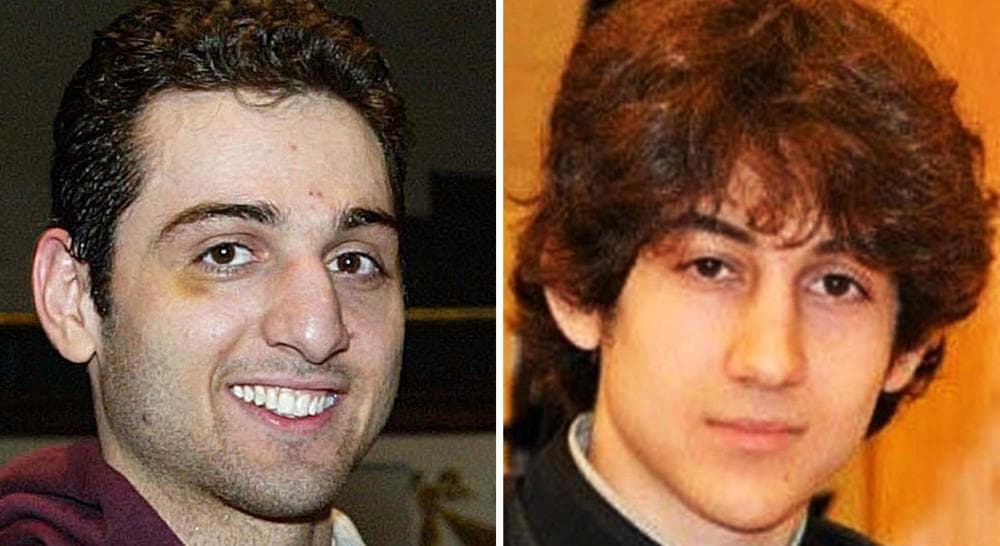Advertisement
The Tipping Point: When Conspiracy Theories Become Dangerous
It has been a common theme of news coverage since the Boston Marathon bombings — what drove the two suspects to terrorism? Accounts to date have focused on factors such as Tamerlan Tsarnaev’s time abroad and professional setbacks. But one trait that both suspects appear to have shared may have also played a significant role — a belief in conspiracy theories.
What explains this widespread belief in conspiracy theories, particularly in Muslim communities? And can it help account for the Boston Marathon suspects’ turn to terrorism?
According to the AP and New York Times, one family member recalls Tamerlan spending time on conspiracy theory websites and seeking out a copy of the anti-Semitic hoax “The Protocols of the Elders of Zion.” Similarly, in a tweet last September, Dzokhar Tsarnaev expressed frustration as to why it is so hard for many “to accept that 9/11 was an inside job.” And during his initial FBI interrogation, Dzhokhar reportedly acknowledged that the bombings were partly motivated by what he and his brother saw as a broader U.S. conspiracy against Muslims that included the wars in Iraq and Afghanistan.
Conspiratorial thinking also seems to run in the family: The Tsarnaev parents have consistently proposed government conspiracies to account for their sons’ alleged involvement in the bombings, and one former associate of the mother has claimed that she subscribed to the 9/11 conspiracy theory in the past.
The Tsarnaevs are not alone in their views here or abroad: According to a 2013 Public Policy Polling survey, 11 percent of U.S. voters believe the government allowed the 9/11 attacks to happen. In the Muslim world, a 2011 Pew poll found that over 50 percent of respondents in eight different countries said they did not believe the attacks were carried out by Arabs.
More recently, conspiracy theories disputing official accounts of the Boston bombings, or the subsequent killing of Tamerlan’s former associate Ibragim Todashev, have garnered significant support online, including mainstream platforms such as Facebook and Twitter.
What explains this widespread belief in conspiracy theories, particularly in Muslim communities? And can it help account for the suspects’ turn to terrorism? Research in social and cognitive psychology offers some insight.

Research on motivated reasoning suggests that people tend to believe what they want to believe. Muslims in particular have reason not to want to believe that mass murder on 9/11 was carried out by co-religionists in the name of their faith. This may lead some to embrace a defensive narrative where they are victims of a larger conspiracy by the U.S. or Israel to launch a self-serving war on Islam.
Conspiracy theories also make people feel smart: Unlike those who blindly accept what the media and authorities tell them, believers know how things really work and who has ultimately benefited from events such as the 9/11 attacks or the campaigns in Iraq and Afghanistan.
Group dynamics can help to reinforce these beliefs, especially if the groups are relatively isolated from dissenting views. Take Muslims in repressive countries: They may hear many more arguments for a conspiracy theory than against it from people and sources they trust and thus become more confident that they have heard all the facts. In addition, those who may have private doubts will be more likely to suppress them in the face of such apparent unanimity from their own social network.
Even the way our minds works at a cognitive level may explain why some people endorse conspiracy theories. The confirmation bias leads people to favor evidence that fits their initial beliefs because it is more understandable than evidence that doesn’t. As a result, conspiracists do often seek empirical support for their theories — it just tends to be highly selective bits of data that they cherry-pick out of a vast body of evidence.
People can also follow the heuristic or mental shortcut, that major events have major causes. World-changing events like the 9/11 attacks seem like they could not have possibly been caused by a small group of individuals; people feel that there must have been a larger conspiracy.
Ignoring the conspiracy theorists in our own communities out of contempt only allows these dangerous ideas to fester and spread outside the sunlight of public view.
It is important to emphasize that current psychological evidence does not support a direct link between holding conspiratorial beliefs and committing violence (after all, the many Americans and Muslims that are sympathetic to conspiracy theories are clearly not violent). But taken together, these findings paint a worrying portrait of the most ardent conspiracy theorists: smug individuals who see themselves as victims of a vast conspiracy, as part of a group of like-minded believers, and as armed with solid evidence for their conclusions.
The research also suggests some possible ways to counter conspiratorial thinking: Some believers may benefit from hearing dissenting views because they harbor similar doubts or are simply unaware of all the evidence. And those who are most likely to be successful at dissuading conspiracists are trusted members of their groups — such as friends, family or teachers.
Ignoring the conspiracy theorists in our own communities out of contempt only allows these dangerous ideas to fester and spread outside the sunlight of public view. We cannot be sure what motivated the Boston Marathon bombing suspects, but the tragic irony is that the Tsarnaevs’ belief in the 9/11 conspiracy theory may have helped motivate them to perpetrate similar terrorist attacks.
Related:
This program aired on June 7, 2013. The audio for this program is not available.